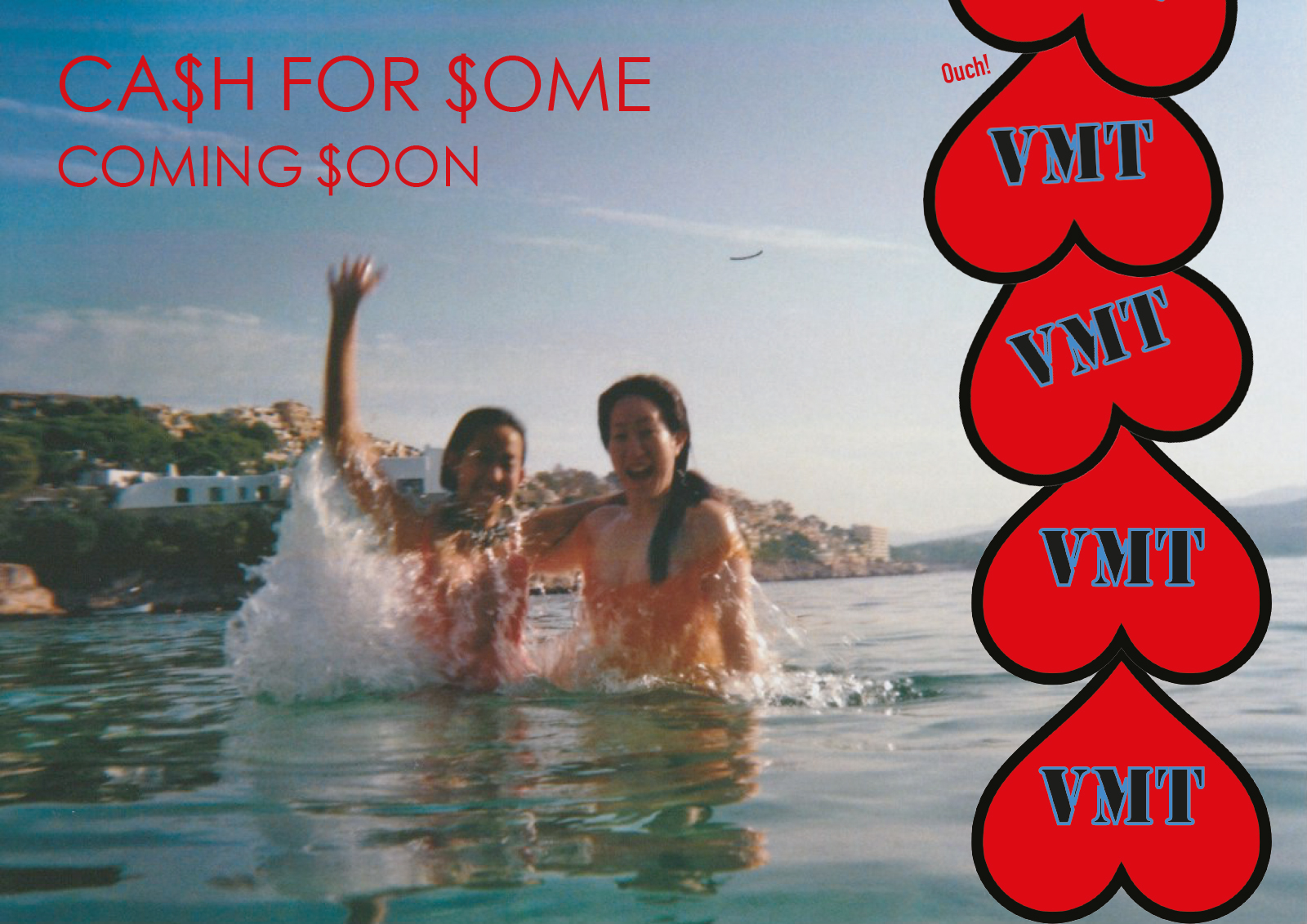Archive
null
KubaParis
book-review-fiona-alison-duncan-exquisite-mariposa


Subheadline
VMT is a collective founded by artists Seyoung Yoon and Joon Yeon Park in Frankfurt in 2017. VMT is short for ‘Vaginal Mystery Tour’ and offers a range of products like clothing, publications, and, soon, money. They’re currently based in Berlin. https://vmt.today/Text
For young college graduate Lelaina, stepping out into the real world is hard but fun. Escorted by minor personal insecurities, dissolutions of old friendships, and a spirited sense of purposelessness, her whimsical experience of junior adulthood depicted in the cult classic “Reality Bites“ (1994, dir. by Ben Stiller(!)) appears like a mere extension of the dizzying labyrinth that is late teen anxiety. The movie’s main character hovers on the perfectly relatable scale of quirkiness, her life a lulling cushion for representing a coming to terms with the demands of having to carve out a life for oneself. Lelaina senses the epic proportions of this phase in a young person’s trajectory and reacts by steadily bringing her handy camcorder up to other people’s faces, documenting her own and her friends’ struggle for jobs, money, and the promise of a fulfilling life. The 1990s were a beautiful time in which a mesmerizing tour de force of mainstream suburban America could convincingly hold the promise to show how a young person grows out of the fantasy world that is an overtly safeguarded childhood via the fantasy world medium that is a rom-com movie.
The narrator in Fiona Alison Duncan’s novel “Exquisite Mariposa“ – who ominously shares the author’s name – is part of a generation whose ideas of life were modeled on Lelaina‘s struggles and their depiction of how she fought and ultimately mastered her teen movie rendered problems. Arriving in LA in the blurry 2010s, Duncan enters “La Mariposa“, an apartment inhabited by a variety of exciting female characters, gorgeously eccentric in their self-discovery, on the ticket of a temporary sublet. Herself at a critical point in her life, the newly found home with its twisted family of precious but inundating inhabitants becomes the catalyst for the book’s narrativized dissections and observations of life as a young, somehow middle-classed creative person in a financially hostile savannah of low-paying jobs and coarse social connections.
The reader gets to know these characters through interspersed profiles riddled with anecdotes and soundbites compiled by an awed Duncan. Inspired by her roommates’ grip on the life she’s so fighting with, the narrator-author tries to translate her discovery into the one tool our generation learned to use for tracing a life that tries to get closer to its very essence: reality TV. La Mariposa‘s most junior member sets up a meeting with a TV production company that quickly agrees on their potential as an exciting insight into life among the palm trees and highway combustion of LA. After joyously succumbing to this all too familiar feeling of an intoxicated “we’re so special, our life should be a sitcom!“, the book trips into its very second chapter with a dispirited tenor, Duncan having already broken the signed contract promo shoot in. Both a wondrous what-if imaginary and an arid sense of a crisis sets in, creating the base for the ensuing monologue’s main occupation in coping with what just happened or rather why it didn’t.
The interstellar ramifications of her Saturn rising in full swing, Duncan’s narrator-self throws the weight of her voice behind an all bearing testimony about her adulting process while holding hands with holistic ideas of Eastern spirituality and astrology. The narrator’s need for rooting her own character development into a bigger picture of decidedly self-formed ways of looking at the world is an essential part of her task to somewhat consciously phrase her reality. Duncan uses this form to slip in and out of a narration that becomes a picture puzzle of reality, setting stages on which to perform the author’s actual life thrown into a glittery kaleidoscope of truths and imaginations. Her play with names and people existing both inside and outside the book, including herself, is a grind on the edge between what happens on and off the screen – be it the screen of a book, a TV screen or the author’s/narrator‘s brokenly pixelated laptop screen – and mirrors the book‘s search for what it continuously calls the “real“. Even though the narrator’s musings about philosophy’s most famous slippery slope are followed by the usual academic doubts through which a whole generation of cultural workers fertilized their thinking in rejecting any account of it, the real, the actual real, the really real, is still a longing and a presentiment as tempting as the unbridgeable gap between reality TV and its promise of capturing something that is actually happening.
Lelaina’s attempt in “Reality Bites“ to mitigate her experience of her own version of the “real“ occupied by friends and lovers ends up similarly disappointing when she sells her filmed footage to a TV production company that molds it into a The Real World styled show. Just like the ever repeated lesson us cynics were taught by Hollywood movies themselves, her ambitions must fall prey to the spiky demands of marketization. Reality only exists in the true moment, unfiltered, raw and real is the movies’ precocious morale. The “real“ that Duncan is thrown back into as her dabbling into the business of TV fails does not give in to such an easy answer though. While writing her novel, Duncan laughs and cries in a surprisingly earnest way over exactly this nauseating gap that befalls any attempt of making concrete what the “real“ is. The belief in the existence of said “real“ is therefore the sole thing attesting to its actual reality and striving towards it the only way of discovery.
Dennis Brzek